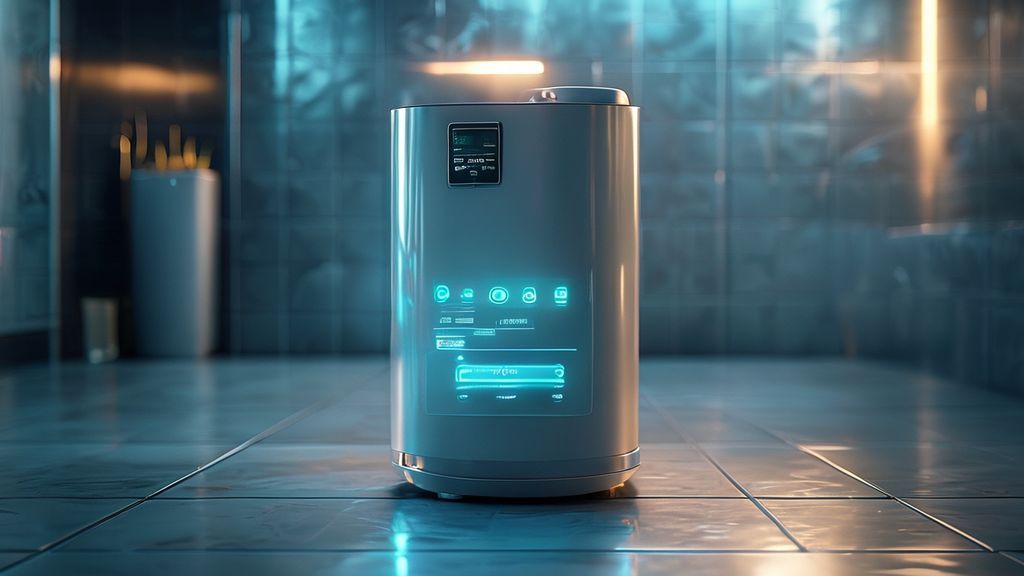Water Heating Cost Calculator
Use our powerful Water Heating Cost Calculator to instantly estimate your monthly energy expenses and discover how much you can save by upgrading to more efficient appliances.
What is the Water Heating Cost Calculator?
The Water Heating Cost Calculator is an interactive utility designed to help homeowners and renters understand the specific energy consumption associated with their daily water usage. By inputting specific variables such as your local energy rates, the type of heating fuel you use (electricity, gas, or propane), and your household size, this tool provides a precise breakdown of your current and potential costs.
Its primary purpose is to bridge the gap between abstract utility bills and tangible household habits, allowing you to visualize the financial impact of water heating and make informed decisions about energy efficiency.
- Water Heating Cost Calculator
- What is the Water Heating Cost Calculator?
- How to Use the Water Heating Cost Calculator
- How Does a Water Heating Cost Calculator Work?
- The Core Components of the Calculation
- Why Your Current Water Bill Doesn't Tell the Whole Story
- Key Inputs for an Accurate Estimate
- Comparing Water Heater Types: Which is Cheapest?
- Tankless vs. Storage Tank: A Cost Breakdown
- The Long-Term Savings of Going Tankless
- Heat Pump Water Heaters: The Efficiency Champion
- Solar Water Heating: Calculating Your ROI
- Frequently Asked Questions
- What is the average cost to heat water per month?
- How much can I save with a tankless water heater?
- Does a water heating cost calculator account for gas vs. electric?
- What is the most energy-efficient water heater?
- How can I lower my water heating costs without buying a new unit?
- Does installing a timer on my water heater really save money?
- What is the 'standby heat loss' mentioned in calculations?
- How do I calculate the cost based on my utility company's rates?
How to Use the Water Heating Cost Calculator

Getting an accurate estimate is simple. Follow these steps to utilize the tool effectively:
- Enter Your Utility Rates: Locate your most recent utility bill and input the cost per kilowatt-hour (for electric) or per therm/CCF (for gas). Accurate rates are essential for a precise calculation.
- Select Your Heater Type: Choose between Gas, Electric, Propane, or Heat Pump. This ensures the calculator applies the correct efficiency factors to the equation.
- Input Household Data: Provide the number of people in your home and your average daily hot water usage. If you are unsure of your usage, the tool often provides default averages based on household size.
- Review the Results: The calculator will display your estimated monthly and annual costs. Look for comparison charts that show how much you would save by switching to a high-efficiency model or a heat pump water heater.
How Does a Water Heating Cost Calculator Work?
A Water Heating Cost Calculator functions as a sophisticated energy auditing tool designed to isolate and quantify the specific expense of generating hot water within a household. Unlike a general utility bill that aggregates all energy usage, this calculator dissects the variables unique to your heating appliance, fuel source, and usage habits to produce a granular cost analysis. By inputting specific data points regarding your water heater’s capacity, energy factor, and fuel type, the algorithm applies thermodynamic principles and local utility rates to simulate the energy transfer required to raise water to a desired temperature. This process effectively bridges the gap between abstract energy units, such as kilowatt-hours or therms, and tangible financial costs, allowing homeowners to pinpoint exactly how much they spend on showers, laundry, and dishwashing. Ultimately, understanding this mechanism empowers users to move from passive bill payment to active energy management.
The Core Components of the Calculation
The mathematical logic behind a water heating cost calculator relies on a precise interplay of thermodynamic efficiency and operational runtime. The primary variable is the Energy Factor (EF), or Uniform Energy Factor (UEF) in modern appliances, which represents the overall efficiency of the heater by accounting for standby losses and recovery efficiency. A higher EF rating indicates that a greater percentage of the energy consumed is actually transferred to the water, rather than being lost through heat dissipation in the tank or exhaust gases. The calculation must also integrate the specific heat capacity of water, which is approximately 8.34 BTUs per pound per degree Fahrenheit, to determine the raw energy required to heat the volume of water used.
Furthermore, the calculator must account for the incoming water temperature, often referred to as the groundwater temperature baseline. This varies significantly by geography; water entering a home in Minnesota may be near 40°F, while in Florida, it may be 75°F. The temperature rise required ($T_{rise}$) is the difference between the incoming temperature and the set point on the heater (typically 120°F). The energy required is directly proportional to this rise, meaning that homes in colder climates inherently incur higher costs to produce the same amount of hot water due to the increased thermal work required by the appliance. Finally, the calculator aggregates the fuel cost per unit (e.g., cost per kWh or per therm) to translate this thermal work into a monetary value.
Why Your Current Water Bill Doesn’t Tell the Whole Story
Standard utility bills are often misleading because they conflate the cost of heating water with the cost of consuming unheated water and other household utilities. A typical water bill charges strictly for the volume of liquid passing through the meter, completely ignoring the energy required to bring that water to a usable temperature. Consequently, a household could reduce their water consumption but still see a spike in their energy bill if the water heater is aging or malfunctioning. The energy used to heat water typically accounts for approximately 18% of a home’s total energy consumption, a figure that is invisible on the water meter but glaringly obvious on the electric or gas statement.
Additionally, traditional bills fail to capture the inefficiencies of the heating system itself. Issues such as sediment buildup in a tank, corroded heating elements, or failing dip tubes increase the energy demand without necessarily changing the volume of water used. A water heating cost calculator exposes these “hidden costs” by comparing your actual usage against the theoretical cost for a system operating at peak efficiency. This distinction is crucial because it highlights whether high bills are due to excessive consumption habits (behavioral) or a deteriorating appliance (technical), allowing for targeted remediation strategies rather than guesswork.
Key Inputs for an Accurate Estimate
To generate a reliable estimate, the calculator requires specific data points that reflect the physical reality of the heating system and the user’s lifestyle. The most critical input is the fuel type, as the economics differ vastly between electricity, natural gas, propane, and oil; gas heaters generally have lower operating costs per unit of energy, though electric heat pumps are vastly more efficient in terms of energy transfer. Users must also input the tank capacity and recovery rate, which determine how quickly the unit can heat a new batch of water. This is particularly important for large families, where simultaneous usage can deplete the tank faster than it can recover, potentially leading to “cold shower” scenarios or the heater running at maximum capacity.
Equally important are the behavioral inputs, specifically the average daily hot water consumption. This is usually estimated by assigning specific flow rates and durations to common activities, such as a 10-minute shower (approx. 20 gallons at 2.0 GPM) or a load of laundry (approx. 30 gallons). The calculator also needs the local utility rates—the cost per kilowatt-hour for electricity or cost per therm for gas—which fluctuate by region and provider. Finally, the setpoint temperature is a vital input; lowering the thermostat from 140°F to 120°F can reduce energy consumption by 6% to 10% due to reduced standby heat loss and lower required temperature rise, a strategy that the calculator can instantly model for the user.
Comparing Water Heater Types: Which is Cheapest?
When utilizing a water heating cost calculator, the initial purchase price often skews the perception of what is truly the “cheapest” option. While a conventional storage tank water heater might appear to be the most affordable upfront, the true cost of ownership is a complex equation involving fuel type, energy factor (EF) ratings, usage patterns, and local climate. To accurately compare which system saves the most money, we must look beyond the sticker price and analyze the Levelized Cost of Energy (LCOE) over the unit’s lifespan. For instance, a standard electric resistance tank is inexpensive to install but exorbitantly expensive to operate in regions with high electricity rates. Conversely, a gas tankless unit has a high upfront installation cost due to venting requirements but offers significant monthly savings. A heat pump water heater (HPWH) sits in a unique position, costing more than a standard electric tank but qualifying for substantial tax credits that can negate the initial investment, effectively making the payback period shorter than most consumers realize.
To visualize the disparity in operational costs, consider the following comparison between a standard 50-gallon electric tank and a high-efficiency gas tankless system in a typical household of four. The “Cheapest” option is rarely the one with the lowest sticker price; it is the one where the cumulative savings outweigh the initial capital expenditure.
| Feature | Standard Electric Tank | High-Efficiency Gas Tankless | Heat Pump (Hybrid) |
|---|---|---|---|
| Installed Cost | $600 – $900 | $2,500 – $4,500 | $1,600 – $3,000 |
| Annual Energy Cost | $450 – $600 | $200 – $300 | $150 – $250 |
| Lifespan | 10 – 12 Years | 20+ Years | 13 – 15 Years |
| 10-Year Total Cost | ~$6,000 | ~$5,500 | ~$4,000 |
Tankless vs. Storage Tank: A Cost Breakdown
The debate between tankless and storage tank systems is the most common comparison users perform in a water heating cost calculator. The fundamental difference lies in the heating strategy: storage tanks maintain a reservoir of hot water 24/7, incurring “standby heat loss,” whereas tankless units heat water on demand. This on-demand mechanism makes tankless units inherently more energy efficient, often achieving Energy Factor (EF) ratings of 0.90 to 0.95 compared to 0.60 for standard tanks. However, the cost breakdown reveals that energy savings are only half the story. Installing a tankless unit, particularly a gas model, often requires upgrading the gas line diameter to handle the higher BTU input and installing new venting pipes (often PVC or stainless steel) through an exterior wall. These retrofitting costs can add $1,000 to $2,000 to the project.
Furthermore, the flow rate capability of a tankless unit dictates its cost and performance. A single small unit may struggle to supply hot water to two showers and a dishwasher simultaneously, potentially necessitating the installation of multiple units or a “parallel” system, which drives up costs. Storage tanks, while less efficient, offer high “recovery rates” and can handle high simultaneous demand for a lower initial investment. When calculating the cost, one must also factor in maintenance: tankless units require annual descaling (flushing) to prevent mineral buildup, especially in hard water areas, which adds a recurring service cost that storage tanks rarely need.
The Long-Term Savings of Going Tankless
Calculating the long-term savings of a tankless system requires a projection of energy prices over 20 years. Because tankless units have a lifespan that is nearly double that of a storage tank, the replacement cost is deferred. While a homeowner might replace a storage tank two or three times in a 20-year span, the tankless unit persists. The savings compound over time. For a household using less than 41 gallons of hot water daily, tankless units can be 24%–34% more efficient. For high-use households (over 86 gallons daily), the efficiency gains are smaller (8%–14%) unless water conservation measures are also implemented.
The financial break-even point is crucial. If the annual savings amount to $150 and the premium paid for tankless (over a tank) is $1,500, the simple payback period is 10 years. However, if energy prices rise by 3% annually, the savings in year 10 are significantly higher than in year 1, shortening the effective payback period. Additionally, tankless heaters provide an endless supply of hot water, which adds intangible value to the home and eliminates the “cold shower surprise,” a distinct quality-of-life improvement that a basic cost calculator cannot quantify.
Heat Pump Water Heaters: The Efficiency Champion
Heat Pump Water Heaters (HPWH), also known as hybrid water heaters, represent the pinnacle of efficiency in the current market. Unlike resistance heaters that generate heat, HPWHs move heat from the surrounding air into the water tank. This process is remarkably efficient, typically using 50% to 70% less energy than a standard electric resistance water heater. From a cost calculation standpoint, a HPWH is often the absolute cheapest option to operate in homes with electric service. However, the calculation must account for the physical requirements of the unit. HPWHs are typically taller and bulkier than standard tanks and require a significant volume of air surrounding them to “harvest” heat.
The “cost” of a HPWH includes the installation environment. They act as dehumidifiers, removing heat and moisture from the air. In a garage or basement, this is beneficial. In a small, cramped closet or a finished living space, the cooling effect can be undesirable, and the unit may struggle to find enough warm air to operate efficiently, dropping its EF rating significantly in colder ambient temperatures (below 40°F). Therefore, the calculator must include the potential cost of installing a dedicated exhaust or intake duct system to ensure the unit has a steady supply of warm air, or the cost of a backup resistance element kicking in during winter. Despite these nuances, the combination of federal tax credits (often up to $2,000 or 30% of the cost) and state utility rebates frequently makes the HPWH the cheapest option on a Total Cost of Ownership basis within the first 5 years.
Solar Water Heating: Calculating Your ROI
Solar water heating systems introduce a variable that most standard calculators ignore: the cost of the sun. These systems use solar thermal collectors (flat plate or evacuated tubes) to heat a fluid that transfers its heat to the water in a storage tank. The Return on Investment (ROI) for solar water heating is heavily dependent on your local climate, solar irradiance, and the cost of the backup fuel (electricity or gas). In sunny, warm climates, a solar system can provide 80-100% of a household’s hot water needs for 8 months of the year, drastically reducing utility bills to near zero for that period.
However, the upfront capital cost is the highest of all types, often ranging from $5,000 to $9,000 installed. To calculate the ROI, you must subtract all available incentives from the sticker price. For example, a $7,000 system might qualify for a $2,100 federal tax credit (30%), bringing the net cost to $4,900. If the system saves $400 annually in gas bills, the simple payback is roughly 12 years. While this seems long, solar thermal systems generally last 20+ years, meaning the final 8 years are pure profit. Furthermore, solar thermal adds value to the home and is immune to fluctuations in electricity prices, acting as a hedge against future utility rate hikes. In a comprehensive cost calculator, solar heating is the only option that can result in a negative cost over time (net profit), provided the system is sized correctly and maintained.
Frequently Asked Questions
What is the average cost to heat water per month?
The average cost to heat water per month typically ranges from $30 to $60, though this varies significantly based on your household size, local utility rates, and the type and age of your water heater. Larger families with higher hot water usage will naturally see higher bills, while smaller households may fall below this average.
How much can I save with a tankless water heater?
You can generally save between 24% to 34% on your water heating costs compared to a standard storage tank model, according to the Department of Energy. Tankless heaters are more energy-efficient because they eliminate standby heat loss by heating water on demand rather than keeping a tank of water hot continuously.
Does a water heating cost calculator account for gas vs. electric?
Yes, most comprehensive calculators allow you to select your fuel type. It is crucial to input the correct fuel type because gas and electricity have very different unit costs (price per therm or kilowatt-hour) and different efficiency ratings for water heaters.
What is the most energy-efficient water heater?
Currently, heat pump water heaters (hybrid models) are the most energy-efficient option available for most homes, often using 60-70% less energy than standard electric resistance models. Solar water heaters are also highly efficient but depend on sunlight availability and require a higher upfront investment.
How can I lower my water heating costs without buying a new unit?
You can lower costs by lowering your water heater’s thermostat to 120°F, insulating your hot water pipes, installing low-flow showerheads, fixing leaky faucets promptly, and simply using less hot water by washing clothes in cold water. These behavioral and maintenance changes can add up to significant savings.
Does installing a timer on my water heater really save money?
Yes, a water heater timer can save money, particularly for households with predictable schedules. By automatically turning off the heater during times when you are asleep or away at work, you prevent the unit from using energy to maintain temperature when you don’t need hot water, reducing standby energy usage.
What is the ‘standby heat loss’ mentioned in calculations?
Standby heat loss is the heat energy wasted by a storage water heater as it constantly works to keep the water in the tank hot, even when no one is using it. Older tank models lose more heat through the tank walls, meaning they have to cycle on more frequently to reheat the water, which increases your monthly bill.
How do I calculate the cost based on my utility company’s rates?
To calculate the cost manually, you need to find your utility bill’s rate per unit (price per kilowatt-hour for electric or price per therm for gas). You then multiply that rate by the water heater’s energy factor (EF) rating and your estimated daily usage. However, using an online calculator is usually easier as it handles these conversions and efficiency factors automatically.







